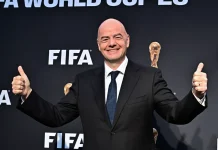In 2015, the FIFA corruption scandal manifested serious power abuse as the top officials took bribes worth huge sums to be allowed to convey media, marketing, and hosting rights. Two dozen people had been charged by both the U.S. and Swiss authorities who also uncovered a culture of criminality that was deeply rooted. FIFA, in its turn, vowed to reform the institution, re-organize its Ethics Committee so as to find ways to detect, investigate and penalise misconduct.
Initial actions were swift. To such prominent names as Sepp Blatter and Michel Platini, lifetime bans and long suspension have been given. But as early momentum faded, questions about the Ethics Committee’s independence and effectiveness intensified. In 2017, the abrupt sacking of ethics bosses Cornel Borbely and Hans-Joachim Eckert pointed further to the intrigues of politics. Borbely warned that
“FIFA’s code of ethics is a dead letter,”
and that internal anti-corruption mechanisms lacked durability.
Structural and operational challenges
Until the year 2025, the Ethics Committee does not have the necessary resources in terms of the law and investigations to combat corruption internationally. Advanced financial crimes entail solid legal skills, which the internal tools of FIFA are not strong enough to deliver. The committee is also susceptible to political interference in that it is run under the administrative structure of FIFA.
Investigations tend to be at the whims of the perpetrators and even popular figures get a free pass. For example, Gianni Infantino faced scrutiny over undisclosed meetings with Switzerland’s Attorney General—a figure involved in investigating FIFA itself. It is after being cleared by the Ethics Committee that showed weaknesses when it comes to neutrality due to the continued external investigations.
The persistent culture of impunity and patronage
Superficial reforms masking deep problems
Although since 2015 there were reforms of wider member voting and more transparency in choosing of hosts, the presence of patronage systems is still there. FIFA Forward funding still comes with little accountability and does so on a basis of rewarding loyalty. The Ethics Committee has not had a hard time going after allegations of financial mismanagement especially where politically charged.
Human rights advocates have long criticized FIFA’s inaction over abuse claims linked to its events, such as migrant worker conditions during World Cup preparations. Even though there are international demands, there are official complaints, the Ethics Committee has provided minimal responsibility in these fields. Institutional reluctance to investigate such matters has allowed abuse to persist.
The role of external investigations
Real consequences for corruption have largely come from outside FIFA. American and Swiss law enforcement officials are still prosecuting the cases relating to the 2015 scandal. These actions, unlike FIFA’s internal responses, have led to convictions, prison terms, and financial penalties. However, it is seen that the historical pattern of revolving door of the sanctioned officials in the football circles points at the lack of permanence of internal discipline.
The powerlessness of the Ethics Committee is further revealed by appeals that diminish or overturn disciplinary action, which conveys the message that a non-compliance is associated with little risk. As an actor, the committee lacks structural autonomy and legal mandate, which makes it only representative of a highly politicized ecosystem.
Implications for football governance and global integrity
Undermining confidence and legitimacy
Accountability has not been enforced in the Ethics Committee, which reduces world confidence in the governance of FIFA. Question marks continue to rise as fans, players, sponsors and national federations raise their doubts on the ethical commitments of FIFA. As a result of the continued selective enforcement, a two-tier system transpires in which well-connected individuals and groups seem to have a free reign.
Doing business involves reputational risk to be involved with companies that are embroiled in scandal. In a situation where ethical implementation is not regularized and, at times characteristically politically-based, smaller federations that base their strengths on good governance and equal funding have the short end of the stick. The outcome is an increasing feeling that FIFA is more focused on finances and politics in place of integrity.
The need for independent oversight
Analysts believe that a complete overhaul of the governance structure of FIFA is needed. The formation of an ethics body that is independent of politics, has investigation as well as related powers and enjoys oversight by other independent parties might help reintroduce legitimacy. This kind of body would have to have direct access to documentation, financial accounts and witness evidence without being foiled by administrative red tape.
There should also be a priority in transparency. Trust can be rebuilt by regular reports on investigations, making the decisions publicly known in detail and involving the stakeholders. Otherwise, FIFA can lose the support of not only the federations interested in the reform, but also a whole generation of supporters who expect a responsible attitude towards ethics.
Looking toward a more accountable future
In 2025, the role of FIFA’s Ethics Committee remains largely performative. Despite initial reform efforts and global scrutiny, the mechanisms for ensuring accountability have failed to mature into a credible enforcement regime. Symbolic gestures continue to mask a system still beholden to vested interests.
As former chief investigator Cornel Borbely underscored after his departure, FIFA’s ethics reforms require more than procedural adjustments. They demand institutional courage and a willingness to challenge powerful stakeholders. Without this, the committee risks becoming a hollow emblem of integrity rather than its guardian.
FIFA’s global influence and the passion it inspires offer a unique opportunity to lead in governance reform. But unless its Ethics Committee evolves into a genuinely independent and effective body, corruption without consequences may remain the sport’s defining legacy. A future rooted in transparency and justice remains possible, but only if FIFA chooses to embrace it fully.













